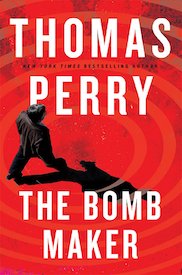The Woman in the Window, A.J. Finn
(William Morrow)
Already a publishing sensation, with movie rights bought and rights sold in 38 countries, as well as the expected comparisons to megahits Gone Girl and Girl on the Train, the question about The Woman in the Window is does it live up to the pre-publication hype? The answer is yes. A propulsive thriller with elements of psychological suspense, the book centers on Dr. Anna Fox, an agoraphobic who cannot leave her Harlem townhouse. Separated from her husband and their small daughter, she frequents online chat rooms for shut ins, plays computer chess, watches old Hitchcock movies, and takes a lot of pills which she chases with red wine. She also spies on her neighbors, tracking their activities inside their homes and on the street. So when she thinks she spies a murder (knowing full well her life has taken on the plot of Rear Window), Fox faces a dilemma: can she leave the house to investigate further, or does her agoraphobia trump her desire to find the truth?
The Widows of Malabar Hill, Sujata Massey
(Soho Press)
Widows, the first book in a new series for Massey, is a fascinating window into the history of India in the 1920s as well as a complex mystery. Our heroine, the Oxford-educated Purveen Mistry, is a solicitor who works in her Parsi family’s law practice in Bombay. Since women are not allowed to appear in court, her work is relegated to drafting contracts and handling other paperwork. When a wealthy Muslim client dies leaving his three wives, who live in isolation called purdah, under the care of a guardian, Mistry is sent to explain to the widows that their husband left all of his money to a charity. Things get complicated when the agent in charge of running the household is murdered, and the wives are left with no one to navigate the outside world for them. Mistry naturally is drawn into the investigation, and the book offers a compelling look into Indian society through the eyes of a remarkable heroine.
A Map of the Dark, Karen Ellis
(Mulholland Books)
FBI Agent Elsa Myers works on the missing children task force, a tough job but one she’s exceptionally good at doing. She’s visiting her dying father in Westchester when she’s called back to Forest Hills, Queens to assist the NYPD in their search for a teenaged girl named Ruby. Ruby has disappeared somewhere between her work at a local café and her home nearby. As the search heats up, Myers’ family and her troubled past begin to interfere with her job. She’s haunted by the murder of her mother and her father’s illness, both of which drive her to question herself and her abilities. Map is a forceful and suspenseful novel which will appeal to fans of Law & Order: SVU and the plethora of recent books about missing girls.
The Bomb Maker, Thomas Perry
(Mysterious Press)
Reading Thomas Perry is like taking an exceptionally interesting adult education class. His Jane Whitefield series, for example, is full of tips on how to go on the lam. Along those lines, Bomb Maker will leave you fairly confident you can manufacture and disable complex explosives. Told from alternating points of view, we get insights into the bomb maker, a lone wolf who lives in an isolated area outside of Los Angeles and is working for a group of terrorists. The bomb maker isn’t planting explosives out of political or personal motives: he just likes to watch things blow up, and especially likes outwitting the LAPD’s bomb squad. In fact, he’d like to wipe them out entirely. But our hero, former bomb squad commander turned private security consultant Dick Stahl, is brought in by the LAPD to try to catch the bomb maker and stop the explosions. Perry’s book is a thoroughly engrossing thriller, as well as a lesson in explosives.
The Perfect Nanny, Leila Slimani (trans. Sam Taylor)
(Penguin Books)
A number one bestseller in France and the winner of the prestigious Goncourt Prize, Nanny comes across the Atlantic on a sea of deserved praise. The nanny of the title, a woman named Louise, works for a couple in Paris, where she tends to their two small children. At first, the couple, Myriam (who is French-Moroccan, as is Slimani) and Paul, are delighted with their new employee. She cooks delicious food, she cleans like a dream, and the children adore her. As the novel progresses, however, tensions start to surface between Louise and her employers, and Louise begins acting strangely. The resultant crime is the apotheosis of all of Paul and Myriam’s fears about letting a stranger into their lives and their home. Slimani is skilled not only at building suspense, but at observing the minute details of middle-class domestic life.






















